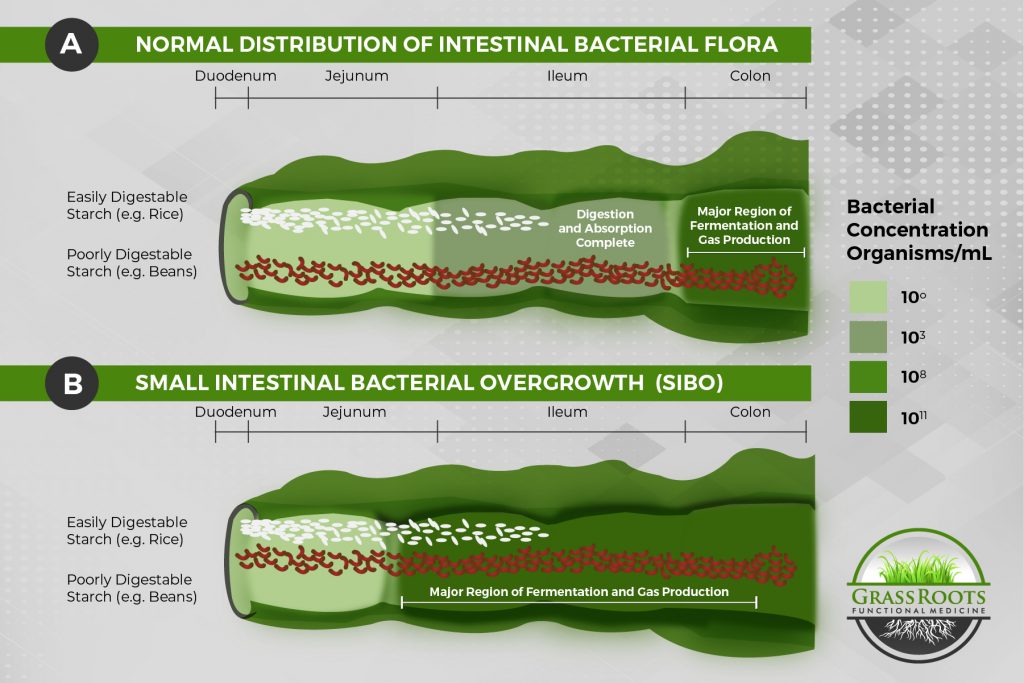Research has shown that for 50% of people with Hashimoto’s and hypothyroidism SIBO (Small Intestinal Bacterial Overgrowth) is an underlying root cause of their condition.
So let’s look at how Hashimoto’s develops in the first place, and why restoring optimal gut health is critical for reversing your condition.
Hashimoto’s as a Problem of the Immune System
One key thing to understand is that Hashimoto’s is first and foremost an autoimmune disease, not a problem of your thyroid.
Autoimmune conditions occur when the immune system goes rogue and begins attacking your body’s own tissues.
In the case of Hashimoto’s, the antibodies sent by your immune system attack your thyroid and cause it to underproduce its hormones. This slows down all of your metabolic processes and leads to symptoms like fatigue, constipation, hair loss, and brain fog.
Your thyroid is simply the innocent bystander caught in your immune system’s crosshairs. The REAL root of the problem (and the key to overcoming it) is your immune system.
So what causes your immune system to misfire and attack your thyroid?
The Role of Leaky Gut in Autoimmune Disease
Alessio Fasano, MD, a world-renowned pediatric gastroenterologist and research scientist, has found that all autoimmune conditions have three factors in common: a genetic predisposition, environmental triggers, and leaky gut.

Leaky gut describes the phenomenon where the tight junctions of your intestinal lining open up, allowing bacteria, toxins, viruses, and food particles to escape your digestive tract and enter your bloodstream.
Since these particles were never meant to be in your bloodstream in the first place, your immune system identifies them as invaders and goes into attack mode.
This triggers a big spike in inflammation as your immune system works overtime to neutralize all of the threats.
Eventually, the immune system becomes overwhelmed, throws up its hand and says I’m done, I can’t handle this burden, and I am just going to attack everything!
That’s when your thyroid comes under fire, triggering Hashimoto’s.
This is critical to understand because if we simply focus on the thyroid (like most conventional doctors do) and ignore the immune system, the real cause of the problem persists and you can develop even more health conditions.
How SIBO Leads to Leaky Gut & Hashimoto’s
Here’s where SIBO or Small Intestinal Bacterial Overgrowth factors into leaky gut and Hashimoto’s.
SIBO develops when you have an increase in the number of bacteria or changes in the types of bacteria present in your small intestine.

Most of the time the overgrowth isn’t from bad bacteria, but good bacteria that is just in the wrong place.
There should normally be relatively few bacteria in your small intestine (less than 10,000 bacteria per milliliter of fluid) when compared with your large intestine or colon (at least 1 billion bacteria per milliliter of fluid). They are also very different types of bacteria.
When these otherwise friendly bacteria from your large intestine and colon colonize the small intestine, where they don’t belong, you can develop a whole host of symptoms and downstream conditions, from bloating and abdominal pain to nutrient deficiencies and food sensitivities.
Even worse, this huge disruption to your small intestine’s ecosystem damages your gut lining, leading to leaky gut and kicking off the cycle of chronic inflammation that causes your immune system to go rogue and attack your thyroid, leading it to underproduce its hormones.
However, once this progresses to Hashimoto’s it becomes a two-way street where your underactive thyroid perpetuates the underlying SIBO problem.
How Hashimoto’s Perpetuates SIBO
Your thyroid hormones play a big role in gut motility by modulating the enteric nervous system and the migrating motor complex (MMC).
The migrating motor complex (MMC) is a pattern of electromechanical activity that sweeps through the intestine between meals to keep food moving through the digestive tract.
In basic terms, this means thyroid hormones impact the speed at which your food is digested and moves through your intestines.
When you have Hashimoto’s and your thyroid hormone levels are low, this whole process slows down, which is why constipation is one of the hallmark symptoms of Hashimoto’s.
And all of the food stuck sitting in your small intestine turns into a feeding frenzy for the bacteria there, exacerbating the bacterial overgrowth.
Treating the Root Cause to Reverse Hashimoto’s
As with any complex chronic condition, the key to reversing Hashimoto’s is to identify and address the root causes that triggered the malfunction in the first place.
By eliminating SIBO and healing your gut, you can stop your immune system’s attack on your thyroid and overcome your Hashimoto’s symptoms.
For many patients, it’s possible to completely restore optimal thyroid function and even come off of all thyroid medications.
However, the solution goes far deeper than just taking a pill or temporarily changing your diet. I hear from a lot of people who’ve tried 30-day programs they found online and taken gut-repairing supplements, only for the problem to come right back once they stop.
You can take all of the supplements in the world, but if you are not addressing the environmental factors like long-term diet, stress, toxins, and mindset you won’t get real results that last.
That’s why at GrassRoots Functional Medicine, we focus on partnership, accountability, mindset, and sustainable lifestyle changes that will protect your health far into the future.
If you’re ready to get to the bottom of your symptoms and believe SIBO may be to blame, check out our Adaptation Program and schedule your free, 10-minute discovery call with me.
About the Author: Dr. Seth Osgood is a Doctor of Nursing Practice, Board Certified Family Nurse Practitioner and Institute of Functional Medicine (IFM) Certified Practitioner. Dr. Osgood received his post-graduate training in Functional Medicine through the IFM and from working with Dr. Amy Myers. He has helped people from around the world improve their health utilizing a Functional Medicine approach.






0 Comments